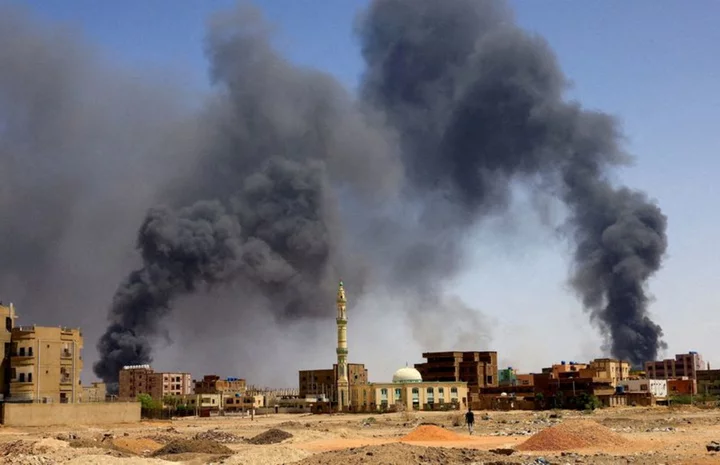CAIRO (Reuters) -Fighting rocked several vulnerable cities in western Sudan on Wednesday in an expansion of the country's almost two-month-old war as the number of people who have fled their homes rose above two million.
The conflict between the army and the paramilitary Rapid Support Forces has caused a humanitarian crisis in Khartoum, as well as major cities in the Kordofan and Darfur regions.
The widening footprint of fighting threatens to prolong the violence and draw in armed groups - particularly those with tribal affiliations - as well as external actors.
Speaking to Al-Hadath TV from El Geneina as gun and artillery fire could be heard, Khamis Abbakar, the governor of West Darfur state, called for international intervention in what he described as a "genocide."
"Civilians are being killed randomly and in large numbers," he said. While the RSF and allied militias had originally targeted areas of El Geneina where members of the Masalit tribe lived, these attacks had now spread to the entire city, he said.
"We haven't seen the army leave its base to defend people," he added. Activists say 1,100 people have been killed so far in the city.
The Darfur region of Sudan has seen periods of conflict since the early 2000s, when millions were displaced and 300,000 killed by attacks from Arab militias known as the Janjaweed. The RSF evolved out of those groups, becoming a legalized governmental force in 2017.
UN Secretary General Antonio Guterres "is highly worried about the increasing ethnic dimension of the violence, as well as by reports of sexual violence," a spokesperson said on Tuesday. His special representative to Sudan, Volker Perthes, blamed "Arab militias and some armed men in RSF's uniform."
In a statement, the RSF called the fighting in El Geneina a tribal conflict, blaming the country's former regime for fanning the flames. It said it had been making efforts to get aid into the city.
Diplomatic efforts led by the United States and Saudi Arabia have faltered, as numerous ceasefires have been violated. On Tuesday, senior U.S. State Department officials said they were considering a new approach for the coming days.
FIGHTING ACROSS DARFUR
The Darfur Bar Association, a local group monitoring the fighting, said on Wednesday that artillery strikes had hit civilian homes in Nyala, capital of South Darfur, after RSF soldiers had complained of not receiving salaries.
"The assault could start again at any moment, we don't feel safe," said Salah Alamin, 39.
The city of Zalingei, capital of Central Darfur, was under siege, the association said. The city of El Fashir, capital of North Darfur, has been quieter but has seen a wave of displacement from RSF-controlled Kutum.
Meanwhile in El Obeid, a hub between Khartoum and Darfur in North Kordofan, residents said the army had begun launching air and artillery strikes against RSF positions. The RSF has controlled the roads branching out from the city, and has agreed with local tribal leaders to secure the area from armed gangs.
In Kadugli, South Kordofan, the army pushed back an RSF attack on one of its bases, as troops loyal to rebel leader Abdelaziz al-Hilu surrounded the city. Sources from al-Hilu's faction, SPLM-N, said that they sought to protect civilians from armed militias.
Within Khartoum, residents reported clashes and air and artillery strikes in southern and eastern districts of the city and in neighbouring Omdurman on Wednesday.
The U.N. said late on Tuesday that some 1.7 million people had been displaced internally and more than 500,000 had left the country.
In army-controlled Port Sudan, meanwhile, middle school students began taking exams, while pilgrims to Mecca began their Hajj journeys, as some attempted to find some normality.
The Sudanese Doctors Union said that at least 958 people have been killed since fighting began on April 15, over the integration of the RSF into the military.
(Reporting by Nafisa Eltahir in Cairo, Khalid Abdelaziz in Dubai, additional reporting by Adam Makary and Maggie Michael in Cairo, Editing by William Maclean)

